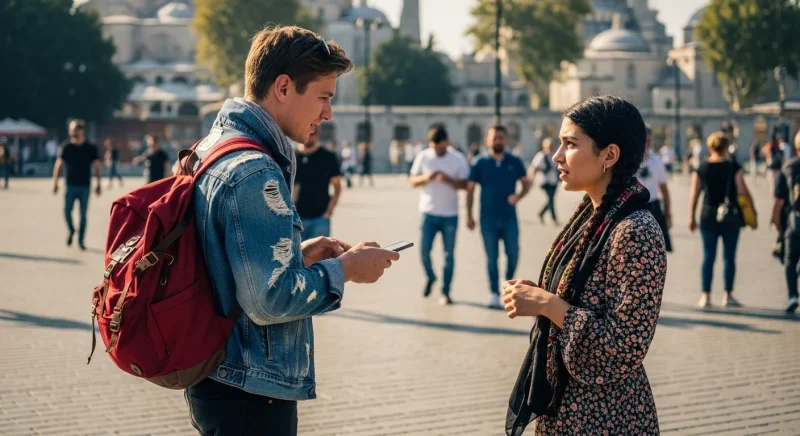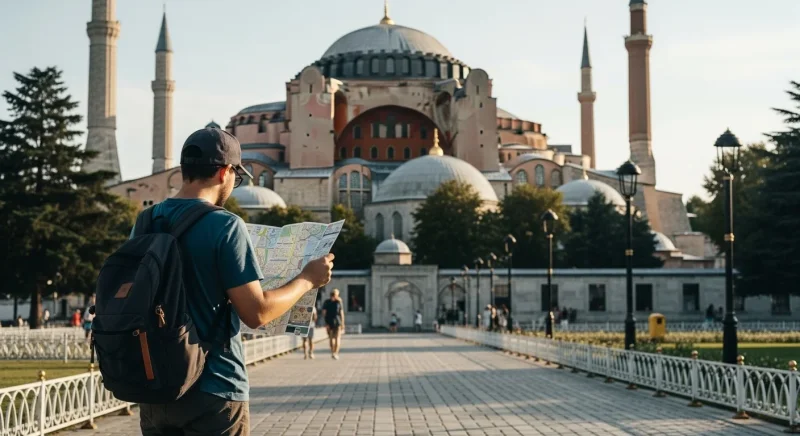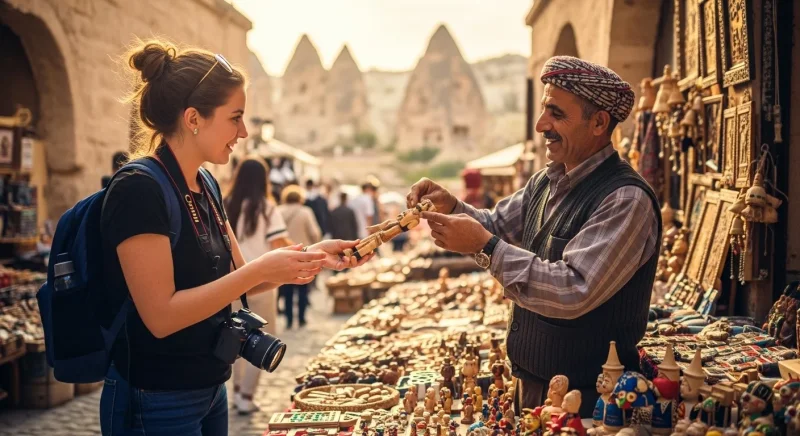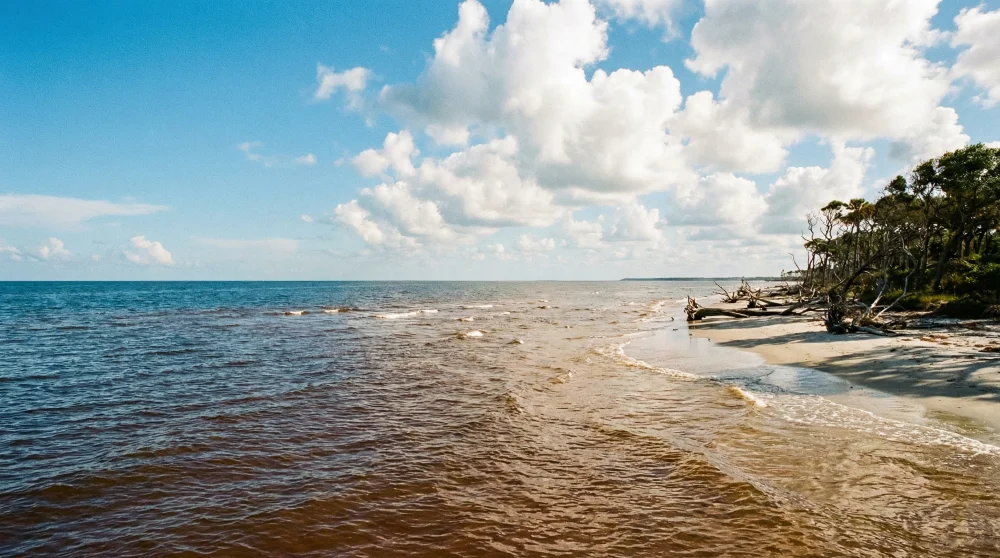If you're planning your first trip to Turkey, the language barrier is likely a top concern. You know the official language is Turkish, but what does that mean for you as a traveler? Will you be able to order food, ask for directions, or navigate the markets?
Quick Info for Travelers
- Official Language: Turkish.
- Can You Use English? Yes. In all major tourist areas (Istanbul, Antalya, Cappadocia, Izmir), you can easily get by only with English.
- English in Rural Areas: Less common. Learning basic phrases is highly recommended.
- Common Misconception: Turkish is not similar to Arabic. They are from completely different language families. Knowing one does not help you understand the other.
As a travel blog focused on practical experience, here is the survival guide you actually need, not a linguistic lecture, but a real-world look at what to expect.

The Short Answer: What is the Official Language of Turkey?
The single official language of the Republic of Turkey is Turkish.
It's the language used in all government offices, schools, legal systems, and media. On the street, in markets, and on TV, you will hear Turkish spoken everywhere.
It uses a Latin-based alphabet (just like English), which makes reading signs much easier than in countries using Cyrillic or Arabic scripts. You will just need to get used to a few unique letters like ç, ş, ğ, ö, and ü.
The Real Question: Can You Get By with English in Turkey?
This is the most important question for any traveler, and the answer is: It completely depends on where you are.
For simplicity, think of Turkey in two parts: the major tourist hubs and everywhere else.

In Major Tourist Hubs (Istanbul, Antalya, Cappadocia)
In Turkey's main tourism centers, you will have almost no problem speaking only English.
This applies to:
- Istanbul: (Especially in Sultanahmet, Beyoğlu/Taksim, Kadıköy, and at the airports).
- Antalya: (Especially in Kaleiçi, Lara, Konyaaltı, and all major coastal resorts in Kaş, Kemer, Alanya, and Side).
- Cappadocia: (The towns of Göreme, Ürgüp, and Uçhisar).
- Coastal Towns: (Bodrum, Fethiye, Marmaris, Çeşme, Kuşadası).
In these areas, people working in hotels, restaurants, cafes, tour agencies, and major shops interact with international visitors daily. Younger generations, in particular, often have a very good command of English. You can comfortably navigate, order food, and buy tickets using only English.
In Rural Anatolia & Smaller Cities
The moment you step off the main tourist path, into smaller towns, rural villages, or the central and eastern regions of Anatolia, the situation changes.
In these areas, do not expect to find English speakers easily. People often don't use English in their daily lives.
This is where having a reliable translation app becomes essential, not just polite. Locals are incredibly friendly and will try to help, but you will need to be the one to bridge the communication gap, usually with a tool like Google Translate.
Common Misconception: Is Turkish Similar to Arabic?
A very common question travelers ask is whether Turkish and Arabic are similar, usually because of the shared religion and geography.
The answer is a simple and definitive no.
They are from completely different language families. Turkish is a Turkic language, more closely related to Azerbaijani, Turkmen, and Uzbek. Arabic is a Semitic language, related to Hebrew and Aramaic.

While modern Turkish has borrowed some loanwords from Arabic (like merhaba, meaning "hello"), the grammar, sentence structure, and core vocabulary are fundamentally different. Knowing Arabic will not help you understand Turkish (and vice versa).
What Other Languages Will You Hear in Turkey?
While Turkish is the dominant and official language, Turkey is a multicultural country. As you travel, you will likely hear other languages in daily life, especially in specific regions.
- Kurdish: This is the second most commonly spoken language, used daily by millions in Southeastern and Eastern Anatolia.
- Arabic: You will hear a significant amount of Arabic spoken, particularly in cities near the Syrian border (like Gaziantep, Hatay, and Şanlıurfa) and in certain neighborhoods of Istanbul, primarily due to the large Syrian refugee population.
- Minority Languages: In different pockets of the country, you might also hear Zaza, Laz (near the Black Sea coast), Circassian, Greek, or Armenian, reflecting the nation's diverse history.
15 Essential Turkish Phrases for Travelers
You don't need to be fluent, but Turkish people greatly appreciate even the smallest effort. A simple "hello" or "thank you" in their language can make a huge difference in your interactions.
Here are the absolute basics to get you started.
| Turkish | English | Pronunciation |
|---|---|---|
| Merhaba | Hello | Mehr-hah-bah |
| Günaydın | Good morning | Goo-nahy-dun |
| İyi akşamlar | Good evening | Ee ak-sham-lar |
| İyi geceler | Good night | Ee ge-je-ler |
| Teşekkür ederim | Thank you | Teh-shehk-kur eh-deh-reem |
| Sağ olun | Thanks (formal) | Sah oh-loon |
| Lütfen | Please | Lüt-fen |
| Evet | Yes | Eh-vet |
| Hayır | No | Hah-yur |
| Afedersiniz | Excuse me / Sorry | Ah-feh-der-sin-iz |
| Özür dilerim | I’m sorry | Uh-zur dee-leh-reem |
| Anlamıyorum | I don’t understand | An-lah-muh-yo-room |
| Bilmiyorum | I don’t know | Beel-myo-room |
| İngilizce biliyor musunuz? | Do you speak English? | Een-gee-leez-je bee-lee-yor moo-soo-nooz |
| Ne kadar? | How much? | Ne kah-dar |
| Bu ne? | What is this? | Boo neh |
| Nerede? | Where is…? | Neh-reh-deh |
| Tuvalet nerede? | Where is the toilet? | Too-vah-let neh-reh-deh |
| Hastane | Hospital | Has-tah-neh |
| Polis | Police | Poh-lees |
| Su | Water | Soo |
| Yemek | Food | Yeh-mehk |
| Fiyat | Price | Fee-yaht |
| Ekmek | Bread | Ek-mek |
| Havalimanı | Airport | Hah-vah-lee-mah-nuh |
| Otobüs | Bus | Oh-toh-boos |
| Taksi | Taxi | Tahk-see |
| Yardım edin | Help me | Yar-dum eh-din |
| Giriş | Entrance | Gee-reesh |
| Çıkış | Exit | Chuh-kush |
Pro-Tips: 3 Must-Have Language Apps for Your Trip
- Google Translate: This is your number one tool. Download the Turkish offline pack before you fly so it works without data or Wi-Fi. The camera (Lens) feature is a lifesaver for instantly translating restaurant menus and road signs.
- Google Maps: While not a language app, all locations and street names are in Turkish. Knowing a few key words will help you navigate: Cadde (Street/Avenue), Sokak (Narrow Street), Meydan (Square), Çıkmazı (Dead End), and Bulvarı (Boulevard).
- Sesli Sözlük/Tureng: This is an excellent Turkish-English dictionary app used by many locals. It's often more accurate than Google Translate for single words or specific technical terms.
Your Next Step: The Best Money-Saving Tip for Tourists
Now that you know how to communicate, the best practical tip for your budget is to get a Müzekart (Museum Pass). This single card gives you access to hundreds of state-run museums and ancient sites across the country, saving you a significant amount of money on entrance fees.
![Jekyll Island Campground Review: Best Sites & [year] Guide](https://www.rotasenin.com/uploads/2025/12/jekyll-island-campground-rv-sites.webp)




![Telfair Museums Savannah Guide: Tickets, Hours & The Bird Girl [year]](https://www.rotasenin.com/uploads/2025/12/telfair-museums-savannah-exhibitions.webp)
Comments (0)
Sign in to comment
Report